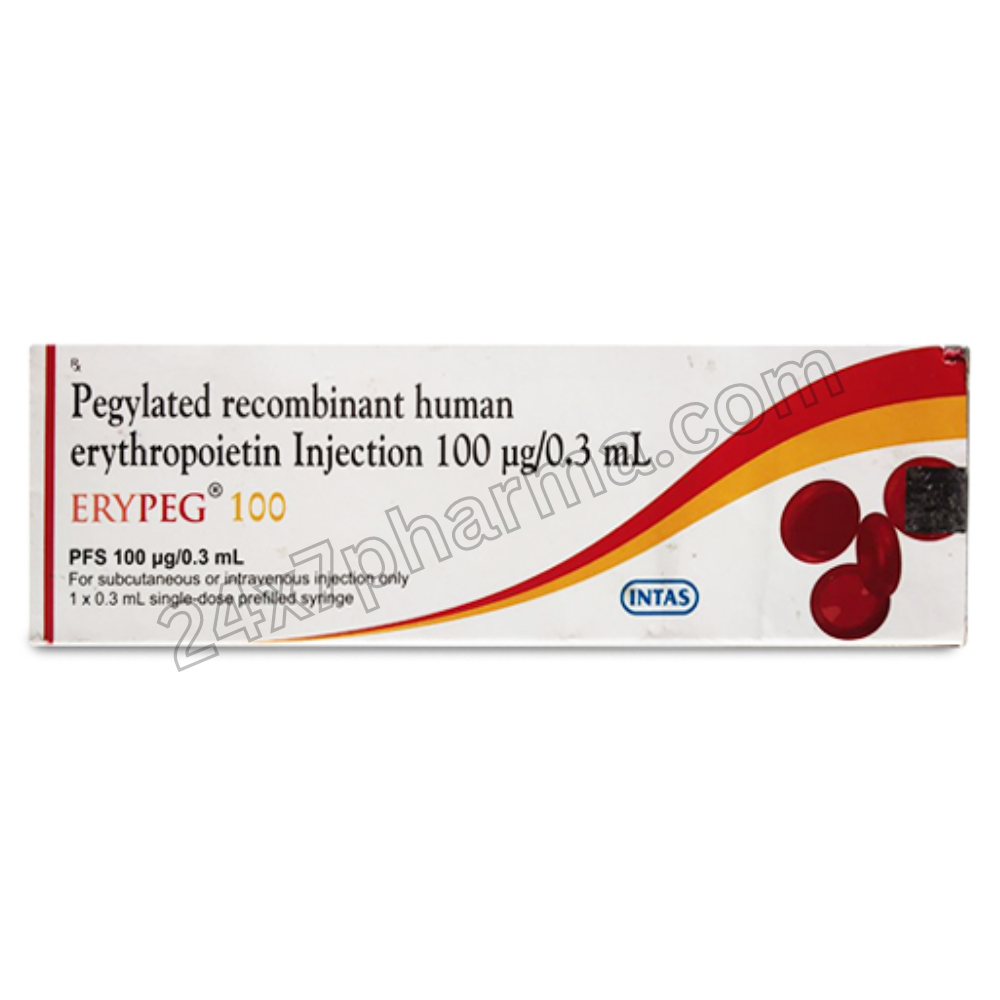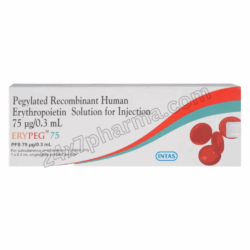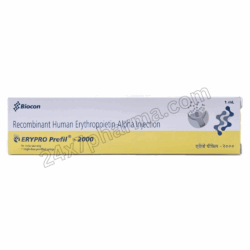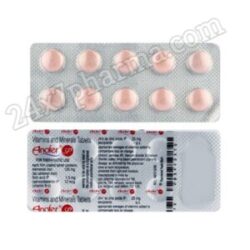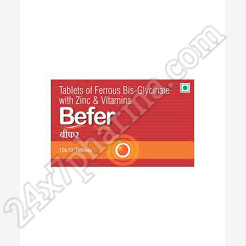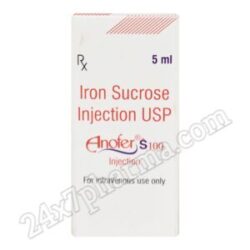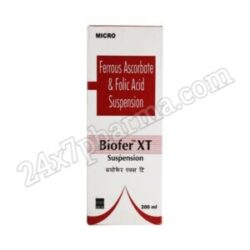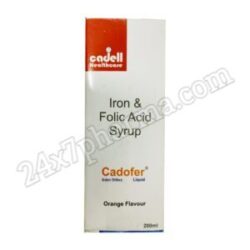Erypeg 100 mcg Injection, containing erythropoietin, is a highly effective treatment designed to combat anemia. This injection is commonly prescribed for patients with chronic kidney disease (CKD) and those undergoing dialysis. By stimulating red blood cell production, Erypeg 100 mcg helps alleviate symptoms of anemia, such as fatigue and weakness, improving the overall quality of life. Its precise formulation makes it a trusted option among healthcare providers.
How Does Erypeg 100 mcg Injection Work?
Erypeg 100 mcg Injection contains erythropoietin, a synthetic hormone that mimics the naturally occurring erythropoietin in the body. Erythropoietin is produced by the kidneys and plays a crucial role in the production of red blood cells in the bone marrow.
When administered, Erypeg 100 mcg injection stimulates the bone marrow to produce more red blood cells. This increased production helps address anemia by replenishing the red blood cell count, enabling better oxygen transport throughout the body. This mechanism makes erythropoietin injection a vital treatment for managing anemia in patients with chronic conditions like kidney disease or cancer undergoing chemotherapy.
How to Use Erypeg 100 mcg Erythropoietin Injection
Proper use of Erypeg 100 is essential for achieving the best results. Always follow your doctor’s instructions when using this medication.
- Administration: Erypeg 100 injection is usually given as a subcutaneous or intravenous injection by a healthcare professional. Self-administration may be permitted if trained by your doctor.
- Dosage: The dosage varies depending on the patient’s weight, hemoglobin levels, and medical condition. As Erypeg 75mcg Injection is also Available but
Regular monitoring of hemoglobin and red blood cell counts will help determine the appropriate dose. - Schedule: Stick to the prescribed schedule to maintain steady red blood cell production. Missing doses may reduce the effectiveness of erythropoietin injection for anemia.
- Storage: Store Erypeg 100 mcg in a refrigerator (2–8°C). Do not freeze or expose it to direct sunlight. Always check the expiration date before use.
Side Effects
While Erypeg 100 mcg Injection is generally well-tolerated, some individuals may experience side effects. Common side effects include:
- Headache
- Nausea or vomiting
- Fever or chills
- Increased blood pressure
- Pain or redness at the injection site
In rare cases, more serious side effects can occur, such as blood clots, seizures, or severe allergic reactions. If you notice symptoms like swelling, difficulty breathing, or chest pain, seek immediate medical attention. Discuss any concerns or side effects with your doctor to ensure safe use of this erythropoietin injection.
Warnings & Precautions
When using Erypeg 100 , consider the following precautions to minimize risks:
- Medical History: Inform your doctor about any pre-existing conditions, especially hypertension, cardiovascular issues, or a history of blood clots.
- Pregnancy & Breastfeeding: Erypeg 100 mcg may not be suitable for pregnant or breastfeeding women. Consult your healthcare provider for guidance.
- Monitoring: Regular blood tests are essential to monitor hemoglobin levels and avoid complications such as excessive red blood cell production.
- Drug Interactions: Notify your doctor about any other medications, supplements, or herbal remedies you are taking, as they may interact with erythropoietin injection.
- Use in Children or Elderly: Adjustments in dosage may be required for pediatric or elderly patients.
By adhering to these precautions, you can use Erypeg 100 mcg safely and effectively.
Frequently Asked Questions (FAQs)
Q1. How long does it take for Erypeg 100 to show results?
Ans: The effects of Erypeg 100 vary from person to person. It may take several weeks of consistent use to see significant improvements in anemia symptoms.
Q2. Are there any dietary restrictions while using Erypeg 100 mcg Injection?
Ans: While there are no specific dietary restrictions, maintaining a balanced diet with adequate iron, folic acid, and vitamin B12 can enhance the effectiveness of erythropoietin injection.
Q3. Can Erypeg 100 Injection cause high blood pressure?
Ans: Yes, increased blood pressure is a potential side effect of this injection. Regular blood pressure monitoring is recommended during treatment.
Q4. Can I use Erypeg 100 mcg Injection if I am allergic to erythropoietin?
Ans: No, patients with known allergies to erythropoietin should avoid using this injection. Inform your doctor about any allergies before starting treatment.
Q5. How often will I need blood tests while on Erypeg 100 mcg Injection?
Ans: Regular blood tests are crucial to monitor hemoglobin levels and ensure the treatment is working effectively. Your doctor will recommend a schedule.
Q6. Can Erypeg 100 mcg Injection cure anemia?
Ans: Erypeg 100 mcg treats anemia by addressing its symptoms and underlying causes. However, it does not cure the condition and requires ongoing management.

